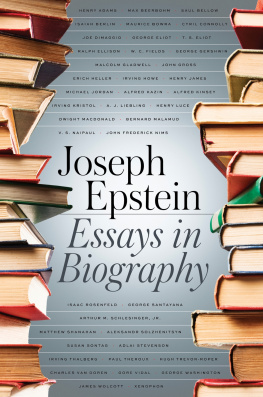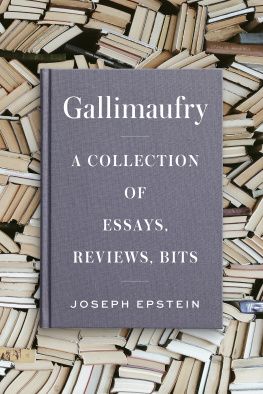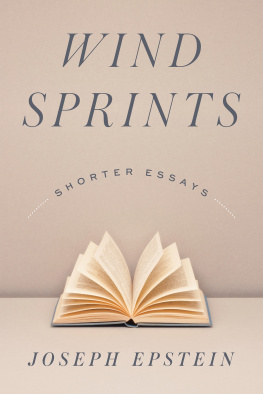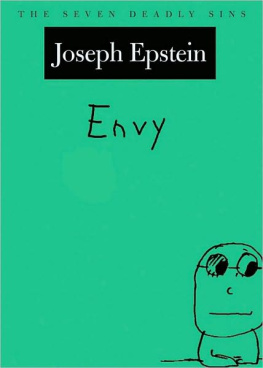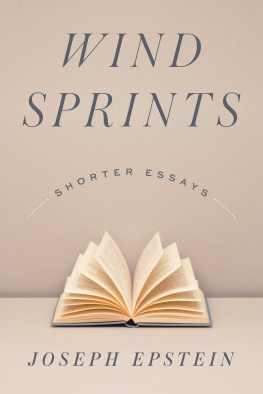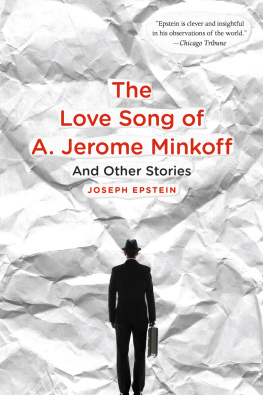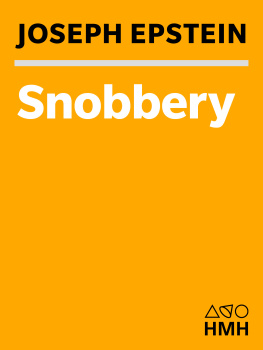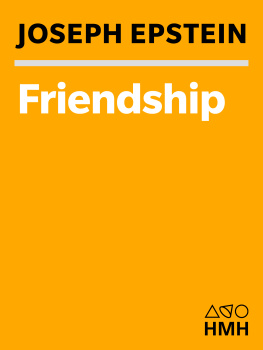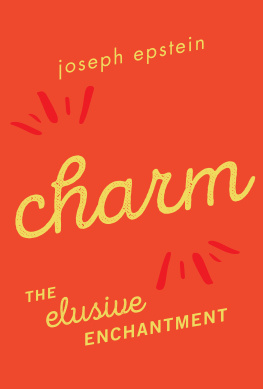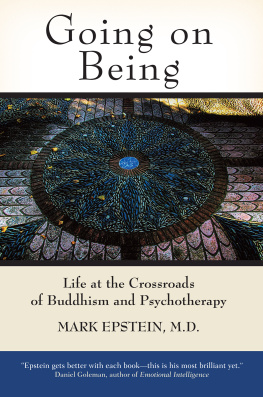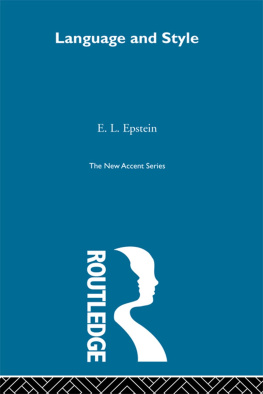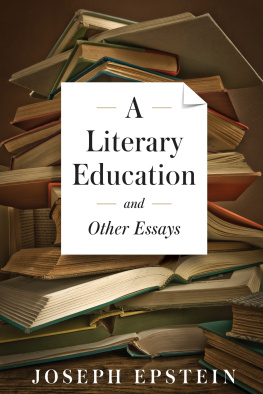Joseph Epstein - Essays in Biography
Here you can read online Joseph Epstein - Essays in Biography full text of the book (entire story) in english for free. Download pdf and epub, get meaning, cover and reviews about this ebook. year: 2012, publisher: Axios Press, genre: History. Description of the work, (preface) as well as reviews are available. Best literature library LitArk.com created for fans of good reading and offers a wide selection of genres:
Romance novel
Science fiction
Adventure
Detective
Science
History
Home and family
Prose
Art
Politics
Computer
Non-fiction
Religion
Business
Children
Humor
Choose a favorite category and find really read worthwhile books. Enjoy immersion in the world of imagination, feel the emotions of the characters or learn something new for yourself, make an fascinating discovery.
- Book:Essays in Biography
- Author:
- Publisher:Axios Press
- Genre:
- Year:2012
- Rating:4 / 5
- Favourites:Add to favourites
- Your mark:
- 80
- 1
- 2
- 3
- 4
- 5
Essays in Biography: summary, description and annotation
We offer to read an annotation, description, summary or preface (depends on what the author of the book "Essays in Biography" wrote himself). If you haven't found the necessary information about the book — write in the comments, we will try to find it.
Now with linking endnotes and index.
Essays in Biography — read online for free the complete book (whole text) full work
Below is the text of the book, divided by pages. System saving the place of the last page read, allows you to conveniently read the book "Essays in Biography" online for free, without having to search again every time where you left off. Put a bookmark, and you can go to the page where you finished reading at any time.
Font size:
Interval:
Bookmark:
In memory of
MATHEW SHANAHAN
(19172012)
Gossip: The Untrivial Pursuit (2011)
The Love Song of A. Jerome Minkoff: And Other Stories (2010)
Fred Astaire (2008)
In a Cardboard Belt!: Essays Personal, Literary, and Savage (2007)
Friendship: An Expos (2006)
Alexis de Tocqueville: Democracy's Guide (2006)
Fabulous Small Jews (2003)
Envy (2003)
Snobbery: The American Version (2002)
Narcissus Leaves the Pool: Familiar Essays (1999)
Life Sentences: Literary Essays (1997)
With My Trousers Rolled: Familiar Essays (1995)
Pertinent Players: Essays on the Literary Life (1993)
A Line Out for a Walk: Familiar Essays (1991)
The Goldin Boys: Stories (1991)
Partial Payments: Essays on Writers and Their Lives (1988)
Once More Around the Block: Familiar Essays (1987)
Plausible Prejudices: Essays on American Writing (1985)
Middle of My Tether: Familiar Essays (1983)
Ambition: The Secret Passion (1980)
Familiar Territory: Observations on American Life (1979)
Divorced in America: Marriage in an Age of Possibility (1974)
I hope no one thinks that I pose these questions with confident answers already in mind, for seeing Washington plain is a project at which even the best minds, of his time and ours, have strained themselves to do. Consider one of the subtlest of those minds, that of Thomas Jefferson, who served as his Secretary of State. In a letter of 1814written nearly fifteen years after Washingtons deathto a Dr. Walter Jones, who was then preparing a history of the young republic, Jefferson claimed to know Washington intimately and thoroughly, and provided the following delineation of his character.
Jefferson did not award Washington universally high grades. He thought Washingtons mind was great and powerful, without being of the very first order. It was a mind slow in operation, being little aided by invention or imagination, but sure in conclusion. Although Washington planned his battles judiciously, he was slow in readjustment when things did not go according to plan. He was, Jefferson thought, fearless though most tremendous in his wrath, with his integrity most pure, his justice the most inflexible. He was in every sense of the word, a wise, a good, and a great man, yet his heart was not warm in its affections and he exactly calculated every mans value, which suggests an ungenerous utilitarianism.
As an intellectual and as a visionary, Jefferson recognized in Washington nothing of the soul mate, and of course the two men would later find themselves in different political parties. Jefferson continues: His time was employed in action chiefly, reading little and that only in agriculture and English history. He had little sympathy for visionary projects. What is more: He was naturally distrustful of men, and inclined to gloomy apprehensions, such that I do believe that General Washington had not a firm confidence in the durability of our government, which is what caused Jefferson to believe Washington thought that the United States must one day end up with the ceremoniousness of the British constitution. What Jefferson couldnt have known was that part of the reason Washington was so highly revered was that he was thought to have gotten the best out of, without ever having been dominated by, intellectuals such as Jefferson and Alexander Hamilton.
A riddle wrapped in a mystery inside an enigma, Churchills fine formulation for the complexity of the old Soviet Union applies nicely to Washington, except you might take the entire packageriddle, mystery, enigmaand double wrap it inside a conundrum. Less talented than other generals, less intelligent than other politicians, not at all well educated to begin with, parochial in both his background and interests, a man with a strong sense of amour-propre but no complex vision, either political, religious, or economic, here was this man, George Washington, without whom, everyone who has thought at all about it agrees, the experiment in government known as the United States would, as like as not, almost certainly have failed. Consider the historian Forrest McDonald, who, in the preface to his book on The Presidency of George Washington , of Washington writes:
He was indispensable to the American experiment in self-government. And yet, as his actions and the quality of his leadership as president are appraised in the following pages, the reader may wonder just what made Washington himself so special. Among others, his chief justice [John Marshall], two of his cabinet ministers [Jefferson and Hamilton], and his most trusted adviser in the House of Representatives [James Madison] will appear to have been at least as able as he wasand considerably more important in formulating the programs and policies that insured the perdurance of the federal government.
McDonald goes on to suggest that the mystery of George Washingtonhe calls it a dual mysterymay not ultimately be solvable, the mans career itself having partaken of myth, for George Washington, in his own lifetime, was self-consciously both more than a mere man and less than a man: his people craved a myth and a symbol, and he devoted his life to fulfilling that need. Perhaps so; but then again, perhaps not.
In Pride and Prejudice , Jane Austen never describes Elizabeth Bennett, which allows girls and young women, when reading the novel, to believe Elizabeth looks like them. Does something similar pertain to George Washington? Do we read into him those traits we either think we have ourselves or wish we did have? I glory in the character of Washington, John Adams, a not uncritical connoisseur of things Washingtonianhe once referred to Washington as a muttonheadwrote to a friend, because I know him to be an exemplification of the American character. The words are simple enough, but what, precisely, do they mean?
What makes an understanding of George Washington complicated is that this riddle wrapped in a mystery inside an enigma and then double wrapped inside a conundrum has also been tied with bows of celebration as gaudy as any historical package in the history of history. Washington was famous even before he was great, monumental while still drawing breath, apotheosized while still very much alive. Vast numbers of cities, a state, human beings, and finally of course the nations capital were named after him. He was under nearly full-time request from portrait painters and sculptors. The heavy myth begins with Parson Mason Locke Weemss biography, published when Washington was still alive and perhaps ablewho knows?to squirm under its smarmy anecdotage.
Shorn of its Weemsian moral exemplumFather, I cannot tell a lie, it was I who chopped down the cherry treeGeorge Washingtons boyhood was fairly typical of the second-line Virginia gentry of which his family was a part. The family would probably have remained part of this lesser squirearchy had not Washingtons father Augustine died suddenly, in 1743, when George was eleven. George was the first of his fathers five children from a second marriage (Augustine had had four children from his first marriage). George was left sufficient land and personal effects to give him a start but not a secure niche in life. He would have to make his own way.
The young George Washington at first thought the way was to be made with the help of his eldest half-brother Lawrence. His fathers major legatee, Lawrence Washington had been educated in England, and was intelligent, polished, and winning enough to marry above himself into the Fairfaxes, one of the first families of Virginia. George idolized his brother, who seems to have repaid this admiration with a steady flow of fine feeling between a man in his mid-twenties and a half-brother fourteen years his junior.
Lawrence thought a naval career might be the answer for George, but the boys mother, a strong-minded woman, known neither for her wide sympathy nor generous impulses, quickly put the kibosh on that. Washingtons education, about which not much is known, apparently did not go beyond the standard rudimentary subjects. (His fathers early death precluded his studying, as the sons of Augustine Washingtons first marriage did, in England.) He learned no foreign languages, a source of mild shame later in life. (He never visited France because, he said, he was embarrassed about requiring a translator there.) His religious training, as his biographer Douglas Southall Freeman writes, was of a sort to turn his mind to conduct rather than creed. At fifteen he became a surveyor. Although no one ever accused Washington of being dreamy, such dreams as he had were chiefly commercial; he saw the way to wealth in the acquisition of land, which he began to acquire on his own from the age of eighteenand continued to do throughout that portion of his life not spent either as a soldier or a political leader.
Font size:
Interval:
Bookmark:
Similar books «Essays in Biography»
Look at similar books to Essays in Biography. We have selected literature similar in name and meaning in the hope of providing readers with more options to find new, interesting, not yet read works.
Discussion, reviews of the book Essays in Biography and just readers' own opinions. Leave your comments, write what you think about the work, its meaning or the main characters. Specify what exactly you liked and what you didn't like, and why you think so.

